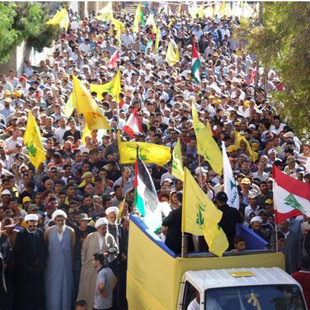Gatherings in Lebanon are for Construction, not Destruction

IRD: Why did March 14 alliance participate in the formation of the Lebanese government?
AZ: After the scandal of Mr. Saad Hariri’s meetings and talks with White House officials, particularly Mr. Obama, held despite the trilateral agreement with Abdullah, the Saudi King, and Mr. Bashar Assad, it was agreed to dismiss the case and the trial of Hariri’s suspected assassins, but unfortunately Mr. Hariri adopted a position under the pressure of the US, and contrary to the agreements, supported the court verdicts and funds passed to the court hearing Hariri’s case, and this arose the anger and firm opposition of groups in the parliament and the government against Mr. Saad Hariri, and subsequently eleven ministers of the March 8 alliance and the president resigned from the cabinet.
Thus, by the resignation of the eleven ministers, Mr. Hariri’s cabinet collapsed and in subsequent conducted negotiations, some 14 March allied representatives left, and this also led Saad Hariri to lose a majority in parliament. Losing the majority provided the background for forming the new government and Saad Hariri was compelled to resign.
Due to the continuous consultations, finally Miqati was proposed as the candidate. Despite the extensive consultations of Mr. Miqati with the March 14 alliance and introduction of him as a moderate guarding the Lebanese people’s rights, by taking a very illogical position Saad Hariri refused to support him. And in the early days, by provoking his supporters, i.e. the March 14 alliance, he tried to create tensions in Lebanon which were prevented by the due presence of the army, and the 8 March alliance and the 14 March alliance were forced to leave the scene. After this, the context was provided for Mr. Miqati to stabilize the government and to introduce the cabinet.
IRD: Some media have predicted that if the uncertainty remains in the cabinet formation, they may be converted to a general uprising. Do you agree?
AZ: I do not. The circumstances of the region and some of the North African and Middle Eastern countries extended to some nations in the Persian Gulf, so that the Lebanese people found out about the mismanagement of the groups affiliated to the West, particularly the March 14 alliance; therefore the context for the resistance groups opposing U.S. policies is provided in the region and the March 14 alliance is obliged to pretend to comply with people’s needs. As you know, even Nasrallah Boutros Sfeir, Lebanon’s Maronite bishop supporting the March 14 alliance, was severely criticized by different political groups and people for his irrational positions and the people’s trust toward him decreased. So the Archbishop Pope XVI was forced to dismiss Mr. Nasrollah Sfeir: It was the winning card in the hands of the resistance groups and pro-stability and pro-security in Lebanon.
IRD: Nabih Berri, the president of the Lebanese parliament, announced that in case of delay in forming the cabinet, the people would demonstrate in protest against the tribal system. Do you think it will happen?
AZ: Certainly, if there is a protest and the demands of people show themselves in a gathering in Beirut, the demonstrations will put pressure on pro-American groups, particularly the March 14 alliance, convincing them to satisfy the Lebanese people’s demands without interference of the great powers, especially the U.S. and its intervention policy. And if the people hold rallies for their legitimate demands, they are all for stability and construction in Lebanon, not destruction.
IRD: You talk about US interference. What is the U.S. approach to Lebanon regarding the recent developments in the region?
AZ: Logically, the region is not in a circumstance that the US and some of its allies like France can have dominance in Lebanon and adopt the same methods to influence, as they have in the past. Although they intend to achieve their goals secretly thorough negotiation and pressure, what is happening today in the region has made the situation very difficult for them. On the other hand, the people of Lebanon follow the footprints of France and the US to see how these countries try to achieve their goals; current government actions based on the demands of other powers will certainly be rejected by people.
IRD: Now that Israel lost its allied party, i.e. Mubarak, in the region, does Lebanon give up?
AZ: Israel is not able to make mischief or to include new conspiracies in its agenda. Certainly such measures or aggression even in Israeli occupied regions like the Gaza strip and the West Bank can lead to dangerous reactions. Therefore, it is not rational for the Zionist regime to operate contrary to its interests.
IRD: Opponents claim that the government is that of coup; do you think the government is that of coup or is it a democracy?
AZ: It is clear that such a discourse is American. Coup has its own meaning. When the elected government makes a decision against a concluded agreement and the people’s interest and surrenders to external pressure, this— forming an abstraction and leaving the parliament—is the most democratic motion against an autocratic government and its lack of attention to public interests. It was the old routine: when rulers and statesmen act against the interests of the people, leaving the government or parliament as a democratic response can cause pressure and a change in the political power.

